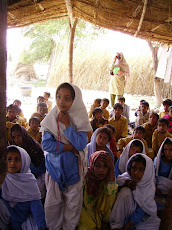Today is International Literacy Day!
Excerpt from UNESCO’s new publication, ‘The Power of Women’s Literacy’
Message from Irina Bokova, Director-General of UNESCO:
"When a woman is literate, she can make choices to dramatically change her life for the better. But ten years into the 21st century, two in every three of the world’s 759 million illiterate adults are women. This is an intolerable situation reflecting one of the most persistent injustices of our times: unequal access to education.
There is no justification – be it cultural, economic or social – for denying girls and women an education. It is a basic right and an absolute condition for reaching all the internationally agreed development goals.
Illiteracy keeps women marginalized and constitutes a foremost obstacle to reducing extreme poverty in a technology-driven world where reading, writing and numeracy are indispensable for enjoying basic rights and opportunities.
For all these reasons, this year’s International Literacy Day puts the spotlight on the highly influential role that literacy plays in empowering women.
Acquiring literacy skills gives women a sense of self-confidence and control over their life and future. This is what empowerment is about: gaining the knowledge to make informed decisions, sharing power in the household and in wider political life. Testimonies from newly literate women bear witness to the far-reaching transformation that new knowledge and skills have on all aspects of their lives.
As the first woman elected to the post of Director-General of UNESCO, I am profoundly committed to advancing the rights of girls and women everywhere, especially through education. Gender equality is one of our global strategic priorities because there can be no sustainable development when women do not enjoy equal rights and opportunities.
Investing in women’s literacy carries very high returns: it improves livelihoods, leads to better child and maternal health, and favours girls’ access to education. In short newly literate women have a positive ripple effect on all development indicators.
This international day aims to mobilize everyone’s attention to the urgent need for increased commitment to literacy, especially for girls and women. UNESCO’s International Literacy Prizes provide inspiring and creative examples of programmes that have had a profound impact on individuals and their communities. They show what works and how well.
Over the past decade, the gender gap in education has narrowed in many countries. Gender parity in literacy has also improved, but all too slowly. Far more has to be done.
I take this occasion to call upon governments, international organizations, civil society and the private sector to scale up their support to literacy. I am confident that the momentum exists to make women’s literacy a priority: we have seen in the past months a bid to accelerate progress towards gender equality with the creation of UN Women.
Literacy gives women a voice – in their families, in political life and on the world stage. It is a first step towards personal freedom and broader prosperity. When women are literate, it is all society that gains."
Irina Bokova
Here are more links to learn about literacy and to celebrate International Literacy Day!
Unesco
- International Literacy Day
- UN Literacy Decade (2003-2012)
- UN Decade of Education for Sustainable Development (2005-2014)
- Literacy for All
- Education for All
- Literacy Exchange - World Resources on Literacy
- EDUCAIDS - The Global Initiative on Education and HIV/AIDS
United Nations
- Literacy rates - Achieve universal primary education (Millennium Development Goal 2)
- UN Education Portal
- UN Works for Women - Education
- UN Literacy Decade - Education for All (2003-2012)
- UN Cyberschoolbus
UNICEF
United Nations Development Programme
- Goal 2: Achieve universal primary education (Millennium Development Goals)
World Bank Group
- International Literacy Day
- Achieve universal primary education (Millennium Development Goal 2)
- Education
Additional resources:
The additional resources links on this page are provided for information purposes only and do not necessarily represent an endorsement by the United Nations.







No comments:
Post a Comment